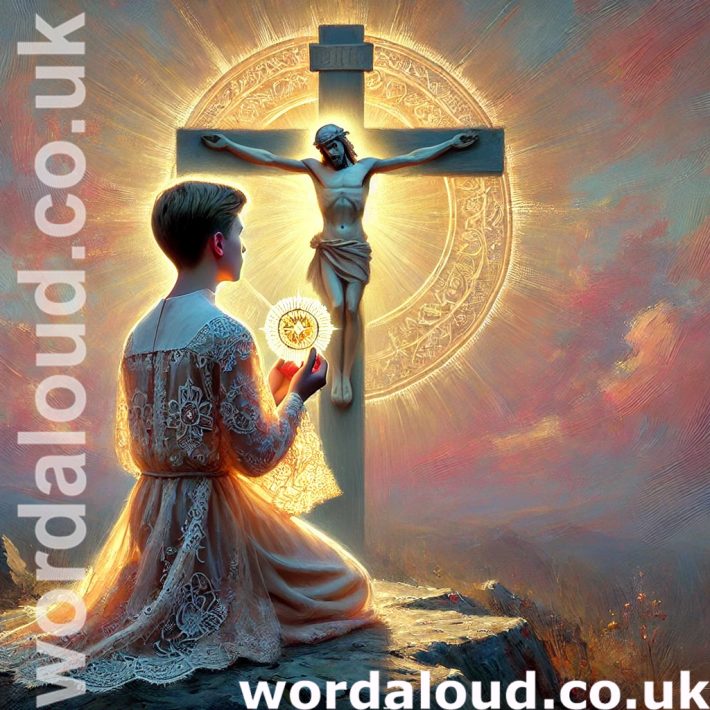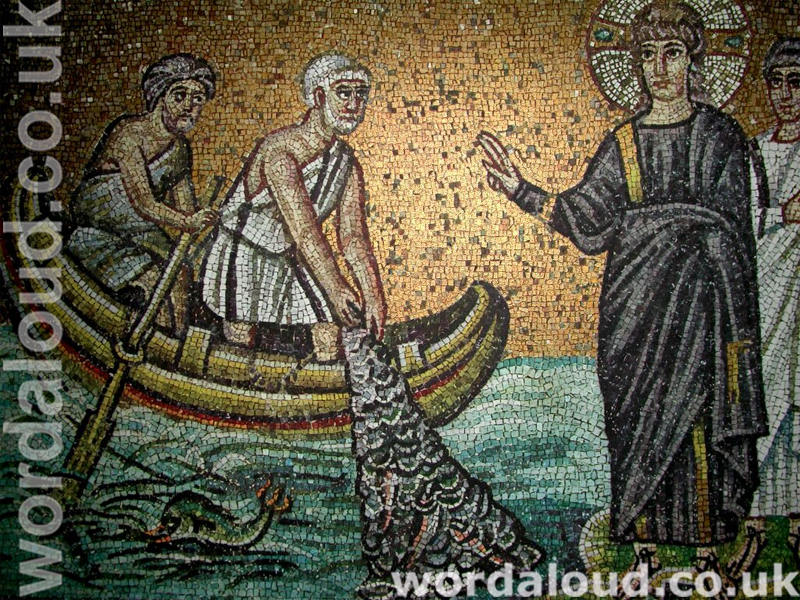Christian Art | A Boy At Prayer With Jesus | Eucharist
Office Of Readings | Eastertide Week 3, Sunday | A Reading From The First Apology Of Saint Justin Martyr In Defence Of The Christians | Celebration Of The Eucharist
‘Celebration of the eucharist.’
Saint Justin Martyr: Celebration of the Eucharist
Saint Justin Martyr’s account of Christian Eucharistic worship, written around 155 AD, is one of the earliest and most significant descriptions of the liturgy outside of the New Testament. Composed as part of his First Apology—a formal defense of Christianity addressed to the Roman Emperor Antoninus Pius—this passage reveals not only the centrality of the Eucharist in the life of the early Church but also the theological, communal, and sacrificial dimensions of Christian worship as it was practised just a few generations after the apostles.
Faith, Baptism And The Moral Life As Prerequisites
Justin opens by affirming that no one may partake of the Eucharist unless they believe the Church’s teachings, have been baptized (‘washed in the regenerating waters’), and live according to Christ’s commands. This threefold requirement—orthodoxy (right belief), sacramental initiation (baptism), and orthopraxy (right living)—highlights the deeply integrated nature of early Christian identity. Eucharistic communion was not a casual or symbolic act; it was a profound participation in the mystery of Christ, accessible only to those who were fully incorporated into his Body, the Church.
Real Presence And Eucharistic Transformation
Justin’s teaching on the Eucharist is unmistakably clear: the bread and wine, through the ‘prayer of thanksgiving’ (Greek: eucharistia), become the body and blood of the incarnate Jesus Christ. This is not metaphorical language. Drawing on the Incarnation itself as an analogy, Justin explains that just as Christ became flesh by the power of the Word, so the Eucharistic elements become his flesh and blood by the power of the same Word, invoked in prayer. This theological reasoning lays a foundation for later doctrinal developments such as the Church’s formal teaching on the Real Presence and transubstantiation.
Notably, this passage predates the formalization of these doctrines by centuries, yet the essential belief is already fully formed—a powerful testimony to the apostolic origin of the Church’s sacramental theology.
The Apostolic Command And Continuity
Justin grounds the Eucharistic rite in the direct command of Jesus: Do this in memory of me. He attributes this tradition to the apostles’ ‘recollections’ (anamneses), which are equated with the Gospels. This demonstrates the early Church’s consciousness of its liturgical life being not a novel invention but the faithful continuation of Christ’s instruction, carried on through apostolic succession. The fact that this teaching is described in a public defence of Christianity underscores Justin’s desire to correct Roman misunderstandings about Christian worship, which had been accused of cannibalism due to misinterpretations of Eucharistic language.
Sunday Worship And Scriptural Proclamation
Justin describes the Sunday assembly (koinē synaxis) as a weekly gathering of Christians from both city and countryside, centered around the reading of Scripture—first the writings of the prophets (the Old Testament), then the apostolic writings (what we now call the New Testament). After the readings, the presider (likely a bishop or priest) offers a homily, encouraging moral and spiritual growth.
This structure is clearly recognizable in the Mass today: the Liturgy of the Word followed by the Liturgy of the Eucharist. Importantly, Justin situates this practice within the broader theological framework of the Lord’s Day—the first day of creation and the day of the Resurrection. Thus, Sunday worship is simultaneously eschatological and cosmological: it celebrates not only the new creation in Christ but also the re-creation of the world through his rising from the dead.
The Eucharistic Prayer And Communion
Justin’s account continues with the presentation of bread, wine, and water, followed by a Eucharistic Prayer during which the president offers thanks ‘to the best of his ability’, and the people respond with ‘Amen.’ This prayer is the epicentre of the liturgy, paralleling the Canon of the Mass. The Eucharist is then distributed to those present, and deacons carry it to those absent—perhaps the sick or imprisoned. This detail reveals the strong pastoral and communal dimension of the Eucharist. It is not a private devotion but a gift of Christ shared with the whole body, particularly the vulnerable.
Charity And Ecclesial Responsibility
The offering of gifts by the wealthy, administered by the president and used for the support of the poor, widows, orphans, and the imprisoned, reflects how closely the Eucharist was tied to practical charity. The Eucharist made real the communion of the faithful with Christ and with one another. It was not only a mystical participation in Christ’s body but also a lived expression of solidarity and sacrificial love. This aspect finds resonance in Acts 2:42–47 and remains central to Catholic social teaching.
Apostolic Tradition In Action
Justin’s testimony, written a mere century after the Resurrection, powerfully confirms that the early Church’s Eucharistic worship—centred on the Word, Sacrament, community, and charity—was already well-developed and firmly grounded in apostolic tradition. His witness is critical not only for understanding the historical roots of the Mass but also for deepening modern appreciation of the Eucharist’s enduring meaning.
In our own time, when the mystery of the Eucharist is often misunderstood, taken for granted, or even rejected, Justin’s words remind us that the Church has always confessed the true and substantial presence of Christ in the Eucharist. His account also reinforces the communal, sacrificial, and transformative nature of this sacrament, which, as the Catechism of the Catholic Church states, is the ‘source and summit of the Christian life’ (CCC 1324).

A Reading From The First Apology Of Saint Justin Martyr In Defence Of The Christians | Celebration Of The Eucharist
No one may share the Eucharist with us unless he believes that what we teach is true, unless he is washed in the regenerating waters of baptism for the remission of his sins, and unless he lives in accordance with the principles given us by Christ.
We do not consume the eucharistic bread and wine as if it were ordinary food and drink, for we have been taught that as Jesus Christ our Saviour became a man of flesh and blood by the power of the Word of God, so also the food that our flesh and blood assimilates for its nourishment becomes the flesh and blood of the incarnate Jesus by the power of his own words contained in the prayer of thanksgiving.
The apostles, in their recollections, which are called gospels, handed down to us what Jesus commanded them to do. They tell us that he took bread, gave thanks and said: Do this in memory of me. This is my body. In the same way he took the cup, he gave thanks and said: This is my blood. The Lord gave this command to them alone. Ever since then we have constantly reminded one another of these things. The rich among us help the poor and we are always united. For all that we receive we praise the Creator of the universe through his Son Jesus Christ and through the Holy Spirit.
On Sunday we have a common assembly of all our members, whether they live in the city or the outlying districts. The recollections of the apostles or the writings of the prophets are read, as long as there is time. When the reader has finished, the president of the assembly speaks to us; he urges everyone to imitate the examples of virtue we have heard in the readings. Then we all stand up together and pray.
On the conclusion of our prayer, bread and wine and water are brought forward. The president offers prayers and gives thanks to the best of his ability, and the people give assent by saying, ‘Amen.’ The eucharist is distributed, everyone present communicates, and the deacons take it to those who are absent.
The wealthy, if they wish, may make a contribution, and they themselves decide the amount. The collection is placed in the custody of the president, who uses it to help the orphans and widows and all who for any reason are in distress, whether because they are sick, in prison, or away from home. In a word, he takes care of all who are in need.
We hold our common assembly on Sunday because it is the first day of the week, the day on which God put darkness and chaos to flight and created the world, and because on that same day our saviour Jesus Christ rose from the dead. For he was crucified on Friday and on Sunday he appeared to his apostles and disciples and taught them the things that we have passed on for your consideration.

Saint Justin Martyr (c. 100 – c. 165 AD)
Saint Justin, known as Justin Martyr, was an early Christian apologist and one of the most important second-century Christian writers. Born in Flavia Neapolis (modern-day Nablus in the West Bank), Justin was raised in a pagan environment and extensively studied various schools of Greco-Roman philosophy, including Stoicism and Platonism, in his search for truth. He eventually encountered Christianity and, recognizing in it the fulfilment of all his philosophical quests, converted around the year 130.
Justin became a teacher of the Christian faith in Rome, where he engaged in public debates and wrote several important works defending Christianity against both pagan misconceptions and Jewish criticisms. His two best-known writings are the First Apology and the Second Apology, addressed to the Roman emperors, in which he explains Christian doctrine, worship, and ethics.
He is especially remembered for his detailed account of the early Christian Eucharistic celebration, the earliest such description outside the New Testament. Around 165 AD, Justin was arrested in Rome along with several of his companions during a persecution under Emperor Marcus Aurelius. Refusing to renounce his faith, he was scourged and then beheaded. Hence, he earned the title ‘Martyr.’
Justin is honoured as a saint by the Catholic Church and the Eastern Orthodox Church. His feast day is celebrated on June 1.








